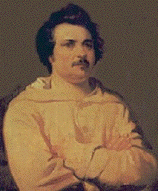May 20: Honoré de Balzac
Honoré de Balzac (1799)
It was on this date, May 20, 1799, Honoré de Balssa was born in Tours, France. He was named for the feast of St. Honoré and later changed his name to that by which we know the prolific French writer, Honoré de Balzac. Against the wishes of his family, he abandoned the law for which he had studied, and tried to become a businessman and a writer. "Today," Balzac once said, "the writer has replaced the priest." He failed at every business undertaking, and took a long time to become recognized as a writer, even working 15 hours a day, so for most of his life Balzac was heavily in debt.
Sometimes ironically called "the Christ of Modern Art," his drastic Rationalism pervades all Balzac’s work. Indeed, the work for which he is chiefly known — a prodigious collection of novels and short stories giving a view of French life in city and country — La Comédie humaine (The Human Comedy), was patterned on Dante's Divina Commedia (Divine Comedy), but with an obviously secular worldview. The culmination of Balzac's Human Comedy, which he conceived in 1830, comprised 90 novels and novellas, and included more than 2,000 characters from all classes and professions. The chief novels in the collection are Louis Lambert (1832), Eugénie Grandet (1833), La Recherche de l'absolu (1834), Le Père Goriot (1835), Les Illusions perdues (1837), César Birotteau (1837), La Cousine Bette (1847), and Le Cousin Pons (1847).
In an 1836 short story, "The Atheist's Mass," Balzac describes his main character, Dr. Desplein, with tongue in cheek:
His bold and unqualified atheism was like that of many scientific men, the best men in the world, but invincible atheists — atheists such as religious people declare to be impossible. This opinion could scarcely exist otherwise in a man who was accustomed from his youth to dissect the creature above all others — before, during, and after life; to hunt through all his organs without ever finding the individual soul, which is indispensable to religious theory. ... This man died, it is said, in final impenitence, as do, unfortunately, many noble geniuses, whom God may forgive.
Bianchon happens to see this esteemed surgeon and outspoken Atheist at a mass and begs to know why an Atheist attends. Bianchon learns that he is honoring the memory of Bourgeat, a benefactor who sacrificed unselfishly so that Desplein may succeed. "I go for his sake," says Desplein, "and say the required prayers; and I say with the good faith of a skeptic — 'Great God, if there is a sphere which Thou hast appointed after death for those who have been perfect, remember good Bourgeat."
An Atheist at a mass! muses Bianchon. "This is as great a mystery as the Immaculate Conception — an article which alone is enough to make a physician an unbeliever."
Desplein goes on, "That, my dear fellow, is as much as a man who holds my opinions can allow himself. But God must be a good fellow; He cannot owe me any grudge."
Honoré de Balzac once said, "The duration of passion is proportionate with the original resistance of the woman," died just months after marrying a wealthy Polish lady with whom he had corresponded for 18 years.
Originally published May 2003 by Ronald Bruce Meyer.


